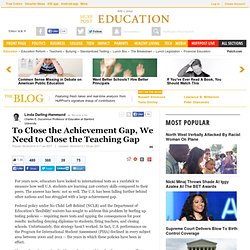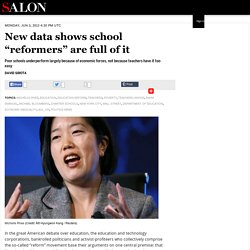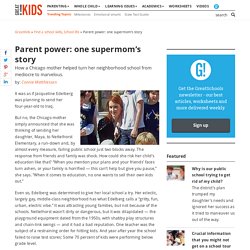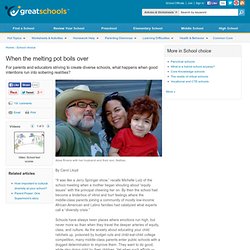

To Close the Achievement Gap, We Need to Close the Teaching Gap For years now, educators have looked to international tests as a yardstick to measure how well U.S. students are learning 21st-century skills compared to their peers.

The answer has been: not so well. The U.S. has been falling further behind other nations and has struggled with a large achievement gap. Federal policy under No Child Left Behind (NCLB) and the Department of Education's 'flexibility' waivers has sought to address this problem by beefing up testing policies -- requiring more tests and upping the consequences for poor results: including denying diplomas to students, firing teachers, and closing schools. Unfortunately, this strategy hasn't worked. In fact, U.S. performance on the Program for International Student Assessment (PISA) declined in every subject area between 2000 and 2012 -- the years in which these policies have been in effect. Now we have international evidence about something that has a greater effect on learning than testing: Teaching.
At Charter Schools, Short Careers by Choice. New data shows school “reformers” are full of it. In the great American debate over education, the education and technology corporations, bankrolled politicians and activist-profiteers who collectively comprise the so-called “reform” movement base their arguments on one central premise: that America should expect public schools to produce world-class academic achievement regardless of the negative forces bearing down on a school’s particular students.

In recent days, though, the faults in that premise are being exposed by unavoidable reality. Before getting to the big news, let’s review the dominant fairy tale: As embodied by New York City’s major education announcement this weekend, the “reform” fantasy pretends that a lack of teacher “accountability” is the major education problem and somehow wholly writes family economics out of the story (amazingly, this fantasy persists even in a place like the Big Apple where economic inequality is particularly crushing). That key — and deliberate — omission serves myriad political interests. Parent Power: One Supermom's story - Parental Power.
It was as if Jacqueline Edelberg was planning to send her four-year-old to Iraq.

But no, the Chicago mother simply announced that she was thinking of sending her daughter, Maya, to Nettelhorst Elementary, a run-down and, by almost every measure, failing public school just two blocks away. The response from friends and family was shock. How could she risk her child’s education like that? “When you mention your plans and your friends’ faces turn ashen, or your family is horrified — this can’t help but give you pause,” she says. “When it comes to education, no one wants to sell their own kids out.” Even so, Edelberg was determined to give her local school a try.
But unlike so many parents who flee when faced with disappointing public schools, Edelberg took the maverick’s route. Makeover madness It wasn’t a great first impression. Without missing a beat, Kurland responded, OK, let’s get to work. Continue reading article below So they scrounged for what they needed. Surviving a bad rep. When the melting pot boils over - School choice. Alisa Rivera with her husband and their son, Nathan.

By Carol Lloyd “It was like a Jerry Springer show,” recalls Michelle Lutz of the school meeting when a mother began shouting about “equity issues” with the principal cheering her on. By then the school had become a tinderbox of vitriol and hurt feelings where the middle-class parents joining a community of mostly low-income African-American and Latino families had catalyzed what experts call a “diversity crisis.”
Schools have always been places where emotions run high, but never more so than when they travel the deeper arteries of equity, class, and culture. As the anxiety about educating your child ratchets up, poisoned by budget cuts and child-eat-child college competition, many middle-class parents enter public schools with a dogged determination to improve them. “Public schools are like an endangered species,” says Amy Wells, professor of education at Columbia University. Democracy's petri dish Urban suburban boomerang.